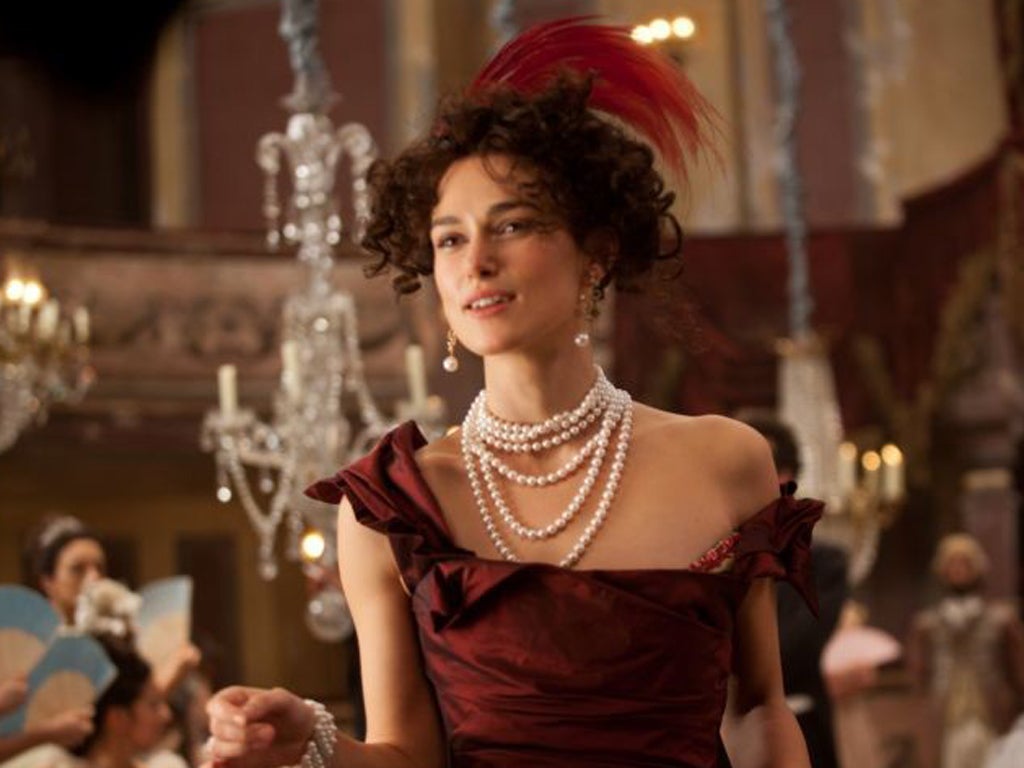Anna Karenina, Joe Wright, 130 mins (15) Dredd, Pete Travis, 95 mins (18); Lawless, John Hillcoat, 116 mins (18)
Keira Knightley's acting range is tested in Joe Wright's lavish adaptation of 'Anna Karenina'

Your support helps us to tell the story
From reproductive rights to climate change to Big Tech, The Independent is on the ground when the story is developing. Whether it's investigating the financials of Elon Musk's pro-Trump PAC or producing our latest documentary, 'The A Word', which shines a light on the American women fighting for reproductive rights, we know how important it is to parse out the facts from the messaging.
At such a critical moment in US history, we need reporters on the ground. Your donation allows us to keep sending journalists to speak to both sides of the story.
The Independent is trusted by Americans across the entire political spectrum. And unlike many other quality news outlets, we choose not to lock Americans out of our reporting and analysis with paywalls. We believe quality journalism should be available to everyone, paid for by those who can afford it.
Your support makes all the difference.First, a confession: I've never read Anna Karenina. No more than the first 150 pages, anyway. I haven't seen any previous adaptations. So I can't tell you how faithful Joe Wright's film is, nor how well it stands up to its predecessors. I do know that Tolstoy's reputation was built on realism. Due to a combination of budget constraint and directorial vision, however, Wright has chosen not the naturalistic bent of the writer's Russian near-contemporary, Stanislavski, but the self-conscious distancing of Brecht.
The film begins, Baz Luhrmann-like, with the raising of a red curtain, and much of the action takes place in a dilapidated theatre, which transforms into the interiors, or unfolds to reveal the exteriors, of imperial Russia. The camerawork, costumes and conspicuous choreography are all gorgeous, but the director – whose dramatic education began in his parents' puppet theatre – never lets you forget that he's directing. This occasionally leads to what might be called "Wrightian alienation".
Keira Knightley is an acquired taste, and there'll doubtless be much discussion of whether her performance is Oscar-worthy or not. She was luminous and endearing in her previous outings with Wright, especially (and unexpectedly) as Lizzie Bennet in Pride & Prejudice (2005). Here, as Anna, she's required to run the gamut of emotions in a two-hour film compressed from 700-plus pages. Each one – amusement, lust, anger, misery – is expressed with a pout. Aaron Taylor-Johnson, another undoubted talent, fails to establish her lover Count Vronsky as much more than a jock douchebag. They're an unsympathetic pair.
The film has its pleasures, though. Jude Law and Matthew Macfadyen, who not so long ago might have competed to play Vronsky, are excellent as, respectively, the mercilessly moral Karenin and Anna's preposterous brother Oblonsky. The romantic subplot between young lovers Levin (Domhnall Gleeson) and Kitty (Alicia Vikander) is handled with charm, and is the most moving thing in the film. But by the time Anna meets her own fate, I found it difficult to care.
I have read a few Judge Dredd strips, and I'm also unlucky enough to have sat through Sylvester Stallone's 1995 film. So I can report that Dredd isn't a sanitised sci-fi blockbuster; it's a blood-spattered B-movie that revels in its 18 certificate. Which, to fans of the original 2000AD comics, is as it should be. One of those fans is Alex Garland, whose screenplay has all the wit and wry irony that escaped the Stallone version.
Garland also has the sense to keep his story small, and his plot is strikingly similar to another recent and effective low-budget action flick, The Raid. Dredd – policeman, executioner, "Judge" of the near future – partners with a rookie, Anderson, in a raid on a 200-storey skyscraper controlled by Lena Headey's deep-scarred drug baroness. Locked in and cornered by her henchmen, the pair are forced to fight their way not out, but up. Olivia Thirlby, as the psychic Anderson, gives the film its modest heart, but there's no human context for Karl Urban's growling and wonderfully inscrutable Dredd, and he never removes his mask: he's Batman without the Bruce Wayne.
A satisfying score accompanies the ultraviolence. The 3D darkens the image somewhat, but combines nicely with director Pete Travis's use of slo-mo in some intriguingly psychedelic moments. Dredd is silly, derivative, and sometimes the budget cracks are visible in the CGI, but it's considerably more enjoyable than anyone had a right to expect.
Lawless, by contrast, is a disappointment. In spite of its spectacular cast and the writer-director pairing of Nick Cave and John Hillcoat – whose previous match-up, The Proposition (2005), was a dark masterpiece – it rarely makes the pulse race. The period detail of Prohibition-era rural Virginia is diverting, as are Jason Clarke and the brilliant Tom Hardy as the bootlegging Bondurant brothers. So, too, Jessica Chastain as their barmaid with a troubled backstory, and Guy Pearce as their nemesis: dandyish, corrupt special agent Charlie Rakes. But Gary Oldman's mobster cameo dribbles away like spilled moonshine, and at the centre of the film is Shia LaBeouf as Jack: the scrappy but soft youngest Bondurant, who matures into his family's violent vocation. Jack is the Michael Corleone role, but LaBeouf is obnoxious when he ought to be captivating, and Lawless is predictable when it ought to be startling.
Critic's Choice
Toby Jones gets sucked into the vortex of 1970s Italian horror in Peter Strickland’s unnerving story about the noise of cinema, Berberian Sound Studio. Meanwhile Vertigo, Kane, 2001 and more of the Ten Greatest Films Ever Made according to the 2012 Sight & Sound poll: judge for yourself at London’s BFI Southbank.
Join our commenting forum
Join thought-provoking conversations, follow other Independent readers and see their replies
Comments